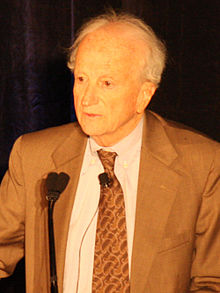Gary Becker | |
|---|---|
 Becker in 2008 | |
| Born | Gary Stanley Becker December 2, 1930 Pottsville, Pennsylvania, U.S. |
| Died | May 3, 2014 (aged 83) |
| Education | Princeton University (BA) University of Chicago (PhD) |
| Academic career | |
| Field | Economics |
| Institution | Columbia University (1957–1968) University of Chicago (1968–2014) |
| School or tradition | Chicago School of Economics |
| Doctoral advisor | H. Gregg Lewis |
| Doctoral students | David O. Meltzer Russ Roberts Walter Block Shoshana Grossbard Darius Lakdawalla Rodrigo R. Soares |
| Influences | Milton Friedman Theodore Schultz |
| Contributions | A Treatise on the Family (1981) Rotten kid theorem |
| Awards | John Bates Clark Medal (1967) Nobel Memorial Prize in Economic Sciences (1992) Pontifical Academy of Sciences (1997) National Medal of Science (2000) John von Neumann Award (2004) Presidential Medal of Freedom (2007) |
| Part of a series on the |
| Chicago school of economics |
|---|
Gary Stanley Becker (/ˈbɛkər/; December 2, 1930 – May 3, 2014) was an American economist who received the 1992 Nobel Memorial Prize in Economic Sciences.[1] He was a professor of economics and sociology at the University of Chicago, and was a leader of the third generation of the Chicago school of economics.[2][3]
Becker was awarded the Nobel Memorial Prize in Economic Sciences in 1992 and received the United States Presidential Medal of Freedom in 2007. A 2011 survey of economics professors named Becker their favorite living economist over the age of 60, followed by Kenneth Arrow and Robert Solow. Economist Justin Wolfers called him "the most important social scientist in the past 50 years."[4]
Becker was one of the first economists to analyze topics that had been researched in sociology, including racial discrimination, crime, family organization, and rational addiction. He argued that many different types of human behavior can be seen as rational and utility-maximizing, including those that are often regarded as self-destructive or irrational. His approach also extended to altruistic aspects of human behavior, which he showed to sometimes have self-serving ends (when individuals' utility is properly defined and measured, that is). He was also among the foremost exponents of the study of human capital. According to Milton Friedman, he was "the greatest social scientist who has lived and worked" in the second part of the twentieth century.[5]
- ^ "The Sveriges Riksbank Prize in Economic Sciences in Memory of Alfred Nobel 1992". NobelPrize.org. Retrieved September 3, 2019.
- ^ "Our Legacy". BFI. Retrieved September 3, 2019.
- ^ "The Fourth Generation in Chicago". Economic Principals. November 16, 2014. Retrieved September 3, 2019.
- ^ Justin Wolfers. "How Gary Becker Transformed the Social Sciences" New York Times May 5, 2014
- ^ Catherine Rampell. "Gary Becker, an economist who changed economics"Washington Post May 5, 2014